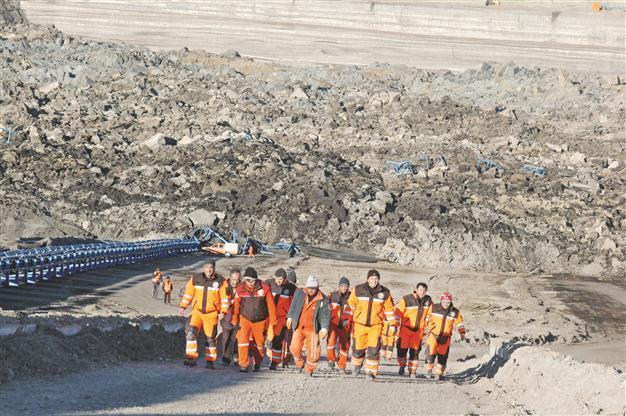Occupational accidents kill 10,000 in ten years
ISTANBUL - Hürriyet Daily News

Rescue workers try to save miners trapped beneath the earth following a mine collapse in Afşin-Elbistan in the southern province of Kahramanmaraş on Feb 10. AA photo
More than 10,000 people have died in work-related accidents in Turkey over the past 10 years, said the Labor and Social Security Ministry.In a response to a parliamentary question, the ministry said there was a dramatic increase in occupational deaths over the last decade.
In 2002, the number of occupational deaths was 872, but by 2010 the number rose to 1,444, Labor and Social Security Minister Faruk Çelik said this week.
Coal mining, metal production and construction were the top industries responsible for the most occupational fatalities, Çelik said.
“The occupational safety of workers is unfortunately not a government priority and workers come second,” said Levent Tüzel, the independent deputy who raised the question on the issue to Parliament.
According to Tüzel, while there was “workplace safety” legislation in the pipeline, it did not amount to “worker safety” legislation. “The safety of the individual worker is not addressed in the legislation,” he told the Hürriyet Daily News yesterday. There were simply not enough precautions taken to ensure that workers were provided sufficient protection from occupational accidents, he said. “The conditions most laborers work in are appalling. Workers in Istanbul’s Tuzla neighborhood don’t even have access to basic safety features like helmets,” said Tüzel.
The shipyards in Tuzla are infamous for worker deaths that have caused public outrage in recent years. There need to be special hospitals that treat work-related illnesses as presently workers have no access to such treatment, said Tüzel.
Tüzel said he believed the sharp increase in workplace fatalities over the past decade was due in part to the fact that workers were forced to work overtime and there was a mentality among them that if they worked more, they would earn more. This led to fatigue and carelessness in the workplace.
“In the past, the workweek was only 45 hours and now workers are forced to work 60-hour workweeks,” Tüzel said. Many workers were employed on a daily or seasonal basis and did not have access to permanent benefits as they struggled with one shift after another at different workplaces, he said.
Following last February’s Afşin-Elbistan coal mine collapse, Tüzel sent the Labor and Social Security Ministry a written questionnaire demanding answers on the deaths of 11 workers. Çelik commissioned a team to investigate the accident.
As a result of the team’s findings, the mine was forced to shut down and the workplace was partially suspended.
Deniz Gürgen from Istanbul contributed to this report.
















